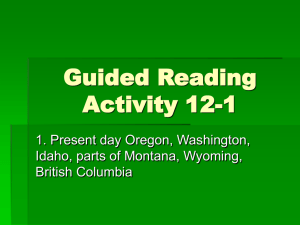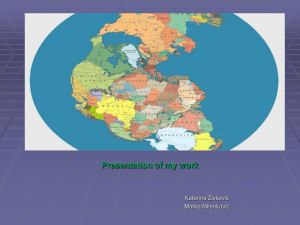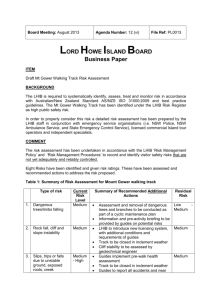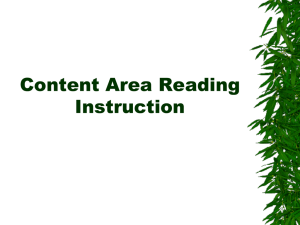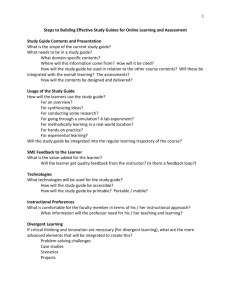Staff Handbook
advertisement
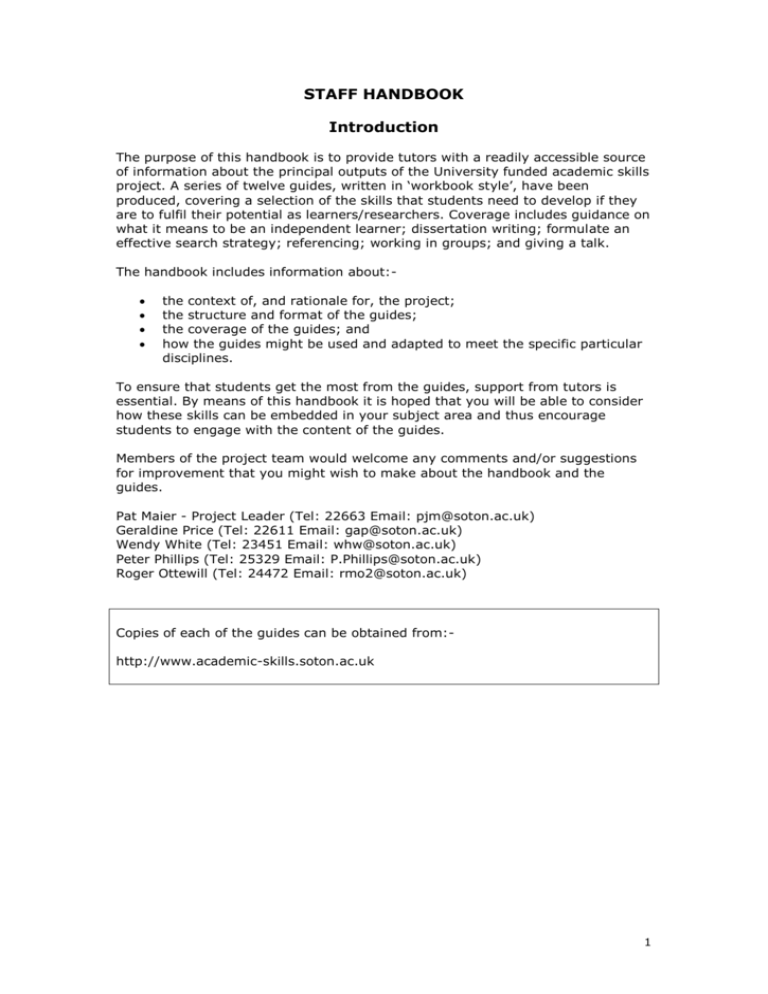
STAFF HANDBOOK Introduction The purpose of this handbook is to provide tutors with a readily accessible source of information about the principal outputs of the University funded academic skills project. A series of twelve guides, written in ‘workbook style’, have been produced, covering a selection of the skills that students need to develop if they are to fulfil their potential as learners/researchers. Coverage includes guidance on what it means to be an independent learner; dissertation writing; formulate an effective search strategy; referencing; working in groups; and giving a talk. The handbook includes information about: the context of, and rationale for, the project; the structure and format of the guides; the coverage of the guides; and how the guides might be used and adapted to meet the specific particular disciplines. To ensure that students get the most from the guides, support from tutors is essential. By means of this handbook it is hoped that you will be able to consider how these skills can be embedded in your subject area and thus encourage students to engage with the content of the guides. Members of the project team would welcome any comments and/or suggestions for improvement that you might wish to make about the handbook and the guides. Pat Maier - Project Leader (Tel: 22663 Email: pjm@soton.ac.uk) Geraldine Price (Tel: 22611 Email: gap@soton.ac.uk) Wendy White (Tel: 23451 Email: whw@soton.ac.uk) Peter Phillips (Tel: 25329 Email: P.Phillips@soton.ac.uk) Roger Ottewill (Tel: 24472 Email: rmo2@soton.ac.uk) Copies of each of the guides can be obtained from:http://www.academic-skills.soton.ac.uk 1 What are academic skills? At Southampton, the phrase ‘academic skills’ is being used because it is felt to be more in keeping with the research-led ethos of the University than any of the possible alternatives. Academic skills have been defined in an internal University document as: … higher order skills which are needed for a student to become an effective learner in both undergraduate and postgraduate studies, and the skills needed to develop into future researchers. Thus, they can be distinguished from ‘study skills’, a phrase more commonly used, through their emphasis on the capacity of students as not only learners but also actual and potential researchers. As a research-led University therefore, we should be keen to ensure that our students leave with this added dimension. This does not mean that they are all researchers, but it does mean that they can, for example, solve problems, critically assess information and cope with the demands of lifelong learning. Why academic skills? Whilst the University is clear that student's engagement with their academic subject is of primary concern, a number of recent developments have increased the need to look at academic skills’ development in relation to curriculum design and student assessment. These include: QAA guidelines including subject benchmark statements; the insertion of specific skills sections to postgraduate training guidelines from the research councils; and skill requirements of employers. Southampton’s commitment to academic skill development is reflected in the University’s Learning and Teaching Strategy. In the very first paragraph it states that:The University will place students at the centre of its education mission in order to develop the knowledge, skills and self-confidence that they need to make an active contribution to a rapidly changing world. It will encourage independent thought, a habit of critique and a commitment to learning throughout their lives [emphasis added]. Who is responsible for academic skill development? Clearly students have the major responsibility for developing their academic skills. However, they often need help and most universities, including Southampton, now have a range of ‘learner development services’ for this purpose. These include paper-based and electronic resources as well as services provided by the library, Learning Resources Centre, Information Systems Services, Dyslexia Services and careers staff. If centrally provided services are to be effective they need to be reinforced by support from ‘front line’ tutors. Providing tutors with assistance in performing this role has been a primary motivation of the Academic Skills Project. This has built on the Academic Study Skills Audit undertaken in 2000/1 and the project’s principal output has been a series of guides covering all the major areas for academic skill development. 2 What guides are available? There are 12 guides: Being an independent learner Understanding your learning style Getting the most from lectures and seminars Reading academically Writing effectively Writing your dissertation Developing an effective search strategy Using Endnote bibliographic software Referencing your work Working in groups Giving a talk Preparing effectively for examinations The guides are generic in nature and have been written with the ‘typical undergraduate student’ in mind. However, from our evaluations we have also found that postgraduate students value them. They are written in an informal style and speak directly to the student using a ‘you’ format. The style is not typical of ‘academic writing’ as they are written in a manner that we hope will engage students. To facilitate engagement, we have included as many activities as possible to encourage students to work through the process of reflecting on the skills they have or are developing. The activities themselves often give students feedback on how they could further develop their skills. Each of the guides stands alone, but there is cross-referencing between them where some topics overlap. This allows students to see the link between the skills and how they integrate for the skilled learner/researcher. How can the guides be used? It has always been recognised that the production of the guides would only be a necessary but not a sufficient condition for the development of academic skills. If students are to make real progress in this respect then the guides need to be an integral component of their learning experience. Two ways in which this can be achieved are generically and by adapting the guides to fit with the requirements of a particular curriculum. A generic approach to using the guides could be to: Identify those which students should consult when their coursework demands it, e.g. group work, oral presentations, Harvard referencing, use of bibliographic software etc. This gives students some support in developing the skills you may be assessing them on. All guides will be electronically available for students (see below). Enable skill development sessions in Faculties or Schools. The guides are designed to be easily used in short face-to-face sessions. The School of Arts currently adopts this approach where lunchtime sessions are offered to students, across a wide variety of disciplines. 3 Provide a structure for student induction sessions, where the guide, Being and Independent Learner, would be particularly relevant; hopefully setting the tone for students’ studies. Encourage students to work thorough individual guides completing the exercises in a linear way to get a wider understanding of the skill and possibly recording their development in their Personal Development Planner (Progress File). This will give students a concrete record of their achievement as well as a mechanism for keeping track on their progress through their programme of study. Of course, academic skills’ development will be just one aspect of their PDP. Use them in one-to-one personal tutoring sessions when it becomes apparent that the student has a particular need which a guide could meet. Although the guides are generic in nature they can be easily adapted to reflect your subject area by providing your own examples for the activities in the guides. The text surrounding the activities could be left untouched. You could use these adapted guides to structure and support student learning for the skills they need. To help you identify where changes might be needed, each guide has a cover sheet providing a descriptive overview, the learning outcomes, the number of interactive activities it contains and some notes for tutors (see guide sections). As an example of how the guides are being adapted for use with distinctive groups of students, we have included a case study based on the experiences of the New Generation Project (see Appendix at the end of this introductory material). Judging by the feedback we received from students on the guides, they greatly appreciate targeted support and reassurance regarding the skill requirements of tasks set for assessment purposes. They are often unsure as to what exactly is expected of them when they have to research an essay or project; evaluate evidence; adopt a critical stance; work independently; collaborate with their peers; give a presentation etc. Hopefully, these guides together with your contribution can make a real difference in this respect. How are the guides being developed electronically? Currently, non-interactive versions of the guides are available electronically for staff and students at: http://www.academic-skills.soton.ac.uk as MS Word files. Once the Learning and Teaching Portal has been set up, this will serve as the principal gateway through which to gain access to the guides. Some Schools are making the guides available to first year students as CDs to take home and keep. In this way the students can record their answers to the activities and save the guide electronically as they work through the sections. We are currently looking at developing the guides into fully web-based interactive resources. This would allow the guides to be embedded more effectively in an elearning environment. Please do contact us if you would like support in adapting the material of these guides and embedding the content in the curriculum. 4 Appendix Case study: modification of academic skills guides for Interprofessional Learning 1. Resources need to be relevant to the whole range of students represented within the cohort of health and social care disciplines at the Universities of Southampton and Portsmouth. Many students will have been away from formal education for some time and may have had negative experiences especially in using learning resources such as Libraries. Students may lack confidence in using C&IT resources. Common Learning from October 2003 will cover 12 programmes across 11 subject disciplines. Since the focus of inter-professional learning is on understanding professional roles in the context of delivery of services for a range of users, the emphasis will be on the diversity of subject disciplines rather than on concentrating on any single discipline within the learning groups. 2. All students will be in their very early stages of their programmes. We will therefore be focusing on the development of awareness of skills and services on the part of the students. 3. The tone has been personalised as much as possible – the emphasis being on the approachability and usability of the resources, a tone which encourages interaction and a supported sense of exploration in learning. Being encouraged sufficiently to try previously unfamiliar or unknown methods, to explore and truly to develop skills as an independent learner. 4. The use of these resources across the two institutions of Southampton and Portsmouth meant that it was necessary to ensure that any Southampton-specific references were accompanied with Portsmouth equivalents and vice versa. The emphasis has been on identifying resources available at both institutions rather than working on the promotion of resources which are available at each of the Universities. 5. It was necessary to ensure that references to forms of work were appropriate to the health and social care disciplines which will be using them in inter-professional learning units. Thus, “dissertation” was replaced by “assignment”. We have been sensitive to working within the frameworks of learning and assessment which prevail for all of the students working on Common Learning 6. Only a subset of the total number of guides have been deployed within the interprofessional learning units (IPLUs) so we needed to ensure that the internal crossreferences to other guides developed but not included in IPLUs were removed. If, subsequently, these guides are introduced into the health and social care work of the IPLUs, we will ensure that the links are re-established since this will maximise the flexibility and usefulness of the resources. For further information contact: Debra Morris dm2@soton.ac.uk Tel. 023 8079 8598 SGH ext. 71-8598 5

